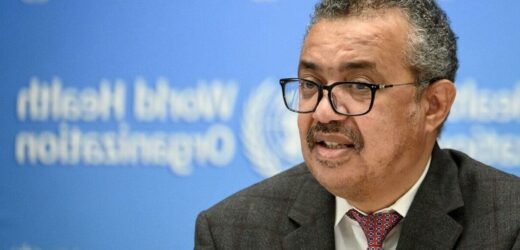China: Shocking footage shows bodies in hospitals
We use your sign-up to provide content in ways you’ve consented to and to improve our understanding of you. This may include adverts from us and 3rd parties based on our understanding. You can unsubscribe at any time. More info
The World Health Organisation (WHO) is “very concerned” about the surge in COVID-19 cases in China following a relaxation of the country’s long-held zero-Covid stance. The comment was made by WHO Director-General and public health expert Dr Tedros Adhanom Ghebreyesus during a press conference on Wednesday. The global health body has called for officials in Beijing to accelerate the vaccination of the most vulnerable of China’s citizens.
China has spent the overwhelming majority of the last two years cleaving to a “zero-Covid” policy which saw the strict application of public health measures like lockdowns, quarantines, mass testing and closure of businesses, schools, shops and other public amenities.
However, in the face of growing backlash from an increasingly exasperated public and significant impacts on the national economy, Beijing officials abruptly ended the majority of the measures earlier this month.
The move has seen case numbers soar with reports that hospitals in the capital and city beyond are filling up with new Covid patients. Experts fear the mortality rate among senior citizens, who are more vulnerable to severe infection.
Chinese Center for Disease Control and Prevention chief epidemiologist Dr Zunyou Wu has predicted that the current spike in infections will persist until mid-January — and has warned that a second wave may follow later in the month as a result of the Chinese New Year celebrations, which will fall on January 22.


Dr Adhanom Ghebreyesus said: “WHO is very concerned over the evolving situation in China, with increasing reports of severe disease.”
He went on to appeal for detailed information on disease severity, hospital admissions and intensive care requirements in China.
He added: “WHO is supporting China to focus its efforts on vaccinating people at the highest risk across the country.
“We continue to offer our support for clinical care and protecting its health system.”


Yesterday, Chinese officials made the curious announcement that not a single person had died of COVID-19 the previous day.
However, this feat was only achieved after redefining the criteria for recording Covid deaths such that only those who died of respiratory failure would be counted.
During a press conference on Tuesday, infectious disease specialist Dr Wang Guiqiang of the Peking University First Hospital said: “At present, after being infected with the Omicron variant, the main cause of death remains underlying diseases.
“Old people have other underlying conditions, only a very small number die directory of respiratory failure caused by infection with Covid.”
However, global health expert Dr Yanzhong Huang of the Council on Foreign Relations in New York City told the AFP: “The definition that focuses on respiratory failure — which develops when the lungs can’t get enough oxygen into the blood — will miss a large number of Covid deaths.
“The new definition is a reversal of the international norm adopted since mid-April during the Shanghai outbreak, which counts a Covid death as anyone who died with Covid.”
DON’T MISS:
Kremlin rages at ‘violation’ after EU smashes Putin’s energy empire [INSIGHT]
China’s Covid crisis deepens as ‘bodies pile up in morgues’ [REPORT]
Christmas Strep A warning as grandparents are more at risk than kids [ANALYSIS]

Epidemiologist and WHO Health Emergencies Programme executive director Dr Michael Ryan said that it was important that vaccination programmes continue — both in China and elsewhere in the world.
He explained: “We’ve been saying this for weeks that this highly infectious virus was always going to be very hard to stop completely with just public health and social measures.
“And most countries have really transitioned to a mixed strategy.
“Vaccination is the exit strategy in that sense from the impact of a wave of Omicron,” he concluded, referencing the current prevalent COVID-19 variant.
Source: Read Full Article


